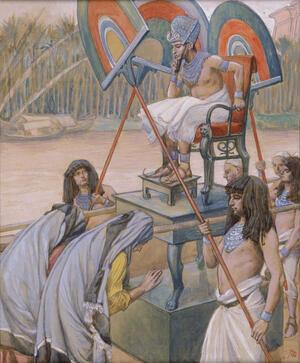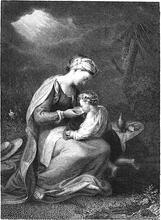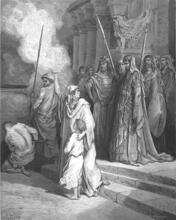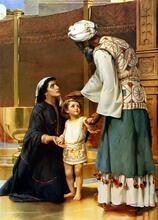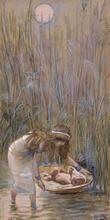Hebrew Women in Egypt: Bible
Hebrew women in Egypt are critical figures in the Bible, especially concerning their maternal and physically nurturing roles. Hebrew midwives help male babies escape the infanticide commanded by the Pharaoh, and another woman helps save baby Moses’ life. These stories show how women were able to undermine the Pharaonic authority and ensure the survival of the Hebrew people in general.
Article
Two references to women at the beginning of the story of the exodus focus on aspects of childbirth and lactation. Women are prominent in this narrative—as givers of life. They perhaps prefigure the “birth” of Israel in the story that follows.
In his attempt to curb the growth of the Hebrew population, Pharaoh commands the midwives, namely Puah and Shiphrah, to kill at birth every boy, but to let the girls live. When the midwives are called to account for their failure to carry out the royal edict, they explain that the Hebrew women are “vigorous” (from the word hayyot; Exod 1:19). This term is related to the word for “animal” and may suggest that Hebrew women gave birth with ease.
Regardless of the precise meaning of the adjective or noun in question, virtually all interpreters agree that the midwives’ claim that Hebrew women typically give birth before the arrival of the midwife is a means to avoid infanticide out of obedience to God and also to avoid incurring Pharaoh’s wrath by putting the blame on the Hebrew women. In both cases, the women outsmart the authorities and contribute to the survival of their people.
The biological functions of the Hebrew women come to the fore again in the next sequence. Exod 2:4–8 reports that when Pharaoh’s daughter discovers the infant Moses in a basket along the riverbank and identifies him as a Hebrew child, the baby’s older sister offers to find a wet nurse from among the Hebrew women. The wet nurse provided by the cunning sister is none other than Moses’ biological mother, who succeeds by this ruse not only in saving the life of the eventual liberator of the Hebrews, but also in getting the foolish Egyptian princess to pay Moses’ mother, Jochebed, a wet nurse’s wages. Again, women, representing all Hebrews held in servitude in Egypt, take part in a scheme to subvert authority and outwit the Pharaonic establishment, thus ensuring the survival and health of their future leader. Furthermore, Miriam also plays a notable role in the Hebrew’s escape from Egypt, leading the women in singing, dancing, and playing drums after crossing the Red Sea, and is the first woman to be referred to as a “prophet.”
It is taken for granted by all the characters in the narrative of Exod 2:6–9 that, even when enslaved, the Hebrew women in Egypt continued to employ wet nurses. This rare use of wet nurses is a possible explanation for the unusual growth of the Israelite population, the supposed threat to Egyptian security that prompted Pharaoh to enslave the Hebrews (Exod 1:7–11). Natural nursing on demand, without supplemental food or liquid and without the use of a pacifier, leads to suspension of ovulation for as long as ten or even fifteen months. This lactational ovulation can be more effective than all other forms of birth control in reducing population growth. On the other hand, women who hand over their infants to wet nurses may become pregnant as early as six weeks after delivery, thus giving birth to up to five times the number of children they would bear if they were nursing their offspring themselves.
Exum, J. Cheryl. “Second Thoughts about Secondary Characters: Women in Exodus 1:8–2:10.” In A Feminist Companion to Exodus to Deuteronomy, edited by Athalya Brenner, 75–87. Sheffield, England: 1994.
Ibid. “‘You Shall Let Every Daughter Live’: A Study of Exodus 1:8–2:10.” Semeia 28 (1993): 63–82.
Gruber, Mayer I. “Breast-Feeding Practices in Biblical Israel and in Old Babylonian Mesopotamia.” In The Motherhood of God and Other Studies. Atlanta: 1992, 69–107.
Meyers, Carol, General Editor. Women in Scripture. New York: 2000.

